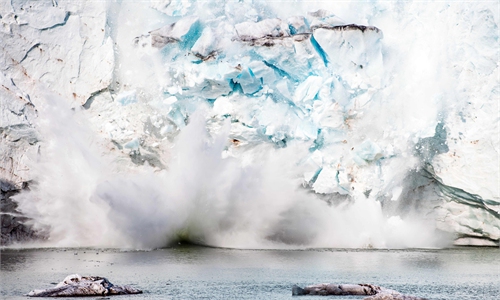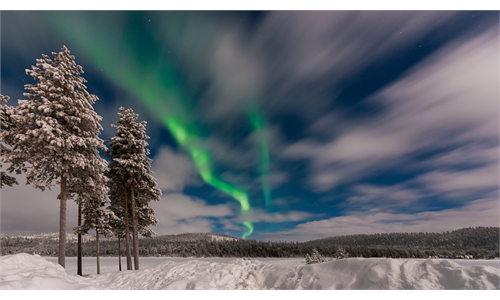The eight countries bordering the Arctic were expected to meet on Thursday in Iceland to discuss peaceful cooperation in the region amid rising temperatures and tensions, in particular between Russia and the US.
Accelerated global warming, untapped resources and new maritime routes opened up by retreating sea ice, as well as the future of local populations, top the agenda for the foreign ministers gathered in Reykjavik.
Canada, Denmark (through its autonomous territory Greenland), Finland, Iceland, Norway, Russia, Sweden and the US meet every two years in the Arctic Council.
Russia is set to succeed Iceland as the rotating chair of the Arctic Council - a body which aims to foster dialogue - at a time of increased military maneuvers in the region.
On the eve of the Council's meeting, the new US Secretary of State Antony Blinken met his Russian counterpart Sergei Lavrov for the first time, ahead of a possible summit between US President Joe Biden and Russian President Vladimir Putin in the near future.
"If the leaders of Russia and the US can work together cooperatively... the world can be a safer and more secure place," Blinken said, warning that Washington would "respond" to any acts of aggression.
"We are ready to discuss all issues without exception if we understand that discussions will be honest and based on mutual trust," Lavrov responded.
Mikaa Mered, a professor at French university Sciences Po and a specialist on the Arctic, said the Biden and Trump administrations "share a common perspective: in saying that the US is back in the Arctic and is a leader in Arctic cooperation."
The two administrations, however, have different motivations for their interest in the region.
"The Trump administration did it mainly for issues related to energy and security, the Biden administration will focus on other subjects, such as climate change," Mered said.
Designed to focus on cooperation between countries and to avoid contentious issues, the Council has generally been a forum for consensus, and the adoption of a joint statement is all but assured this time.
In addition to the countries bordering the Arctic, the Council also includes six organizations representing the indigenous peoples of the region and 13 observer countries, including China.
Its mandate explicitly excludes military security and the body has no formal legal powers.
Accelerated global warming, untapped resources and new maritime routes opened up by retreating sea ice, as well as the future of local populations, top the agenda for the foreign ministers gathered in Reykjavik.
Canada, Denmark (through its autonomous territory Greenland), Finland, Iceland, Norway, Russia, Sweden and the US meet every two years in the Arctic Council.
Russia is set to succeed Iceland as the rotating chair of the Arctic Council - a body which aims to foster dialogue - at a time of increased military maneuvers in the region.
On the eve of the Council's meeting, the new US Secretary of State Antony Blinken met his Russian counterpart Sergei Lavrov for the first time, ahead of a possible summit between US President Joe Biden and Russian President Vladimir Putin in the near future.
"If the leaders of Russia and the US can work together cooperatively... the world can be a safer and more secure place," Blinken said, warning that Washington would "respond" to any acts of aggression.
"We are ready to discuss all issues without exception if we understand that discussions will be honest and based on mutual trust," Lavrov responded.
Mikaa Mered, a professor at French university Sciences Po and a specialist on the Arctic, said the Biden and Trump administrations "share a common perspective: in saying that the US is back in the Arctic and is a leader in Arctic cooperation."
The two administrations, however, have different motivations for their interest in the region.
"The Trump administration did it mainly for issues related to energy and security, the Biden administration will focus on other subjects, such as climate change," Mered said.
Designed to focus on cooperation between countries and to avoid contentious issues, the Council has generally been a forum for consensus, and the adoption of a joint statement is all but assured this time.
In addition to the countries bordering the Arctic, the Council also includes six organizations representing the indigenous peoples of the region and 13 observer countries, including China.
Its mandate explicitly excludes military security and the body has no formal legal powers.


